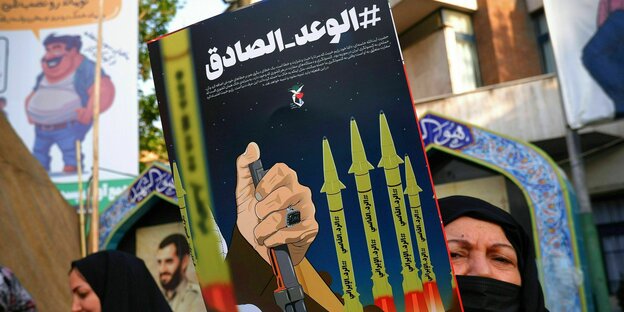Iran's attack on Israel has become evident, says Iran expert Raz Zimmt. What is now crucial is how Israel uses the margin of reaction.

Attack: supporters of the Tehran regime at a demonstration after the attack on Israel on Sunday Photo: Rouzbeh Fouladi/imago
taz: For many years, Iran has built a dense network of proxy militias in the Middle East, through which the country exerts influence in the region. What motivated Tehran to change this strategy and risk open war with Israel and the United States?
Raz Zimmt: The escalation has been coming for some time. For months, senior Iranian officials have been repeatedly killed in suspected Israeli strikes in Syria and Lebanon. The pace and severity of attacks are increasing and there are growing voices in Tehran calling for an end to so-called strategic patience. The airstrike on Tehran's consulate in Damascus on April 1, which killed two Iranian Revolutionary Guard generals, was the turning point. Subsequently, hardliners who favored a direct counterattack without turning to proxies in the region, such as Hezbollah or militias in Syria and Iraq, managed to prevail.
What do Tehran's leaders want to achieve?
It's a dilemma: Iran does not want an open war with Israel and the United States and has resisted since the beginning of the Gaza war. At the same time, the country's leaders want to restore its military deterrent, which has failed to prevent Israel from attacking Iranian military personnel outside Iran in recent months.
is an expert on Iran at the Institute for National Security Studies (INSS) in Tel Aviv, Israel.
In this sense, did the Iranian attack work?
On the one hand, it failed because Israel and its allies were able to intercept almost all of the missiles. On the other hand, Tehran's goal may not have been to cause harm. This is also supported by the fact that they did not target population centers. Even without a hit, the direct attack with more than 300 drones and missiles was so unexpected and unprecedented that it changed the Israeli equation definitively. The next time Israel's military and intelligence agencies plan to kill an Iranian, they should consider the possibility of direct retaliation. This message has arrived.
After the attack, Iranian leaders said the matter was “closed.” How will Israel respond to this?
The Israeli government must respond to such an attack. Israel faces the same dilemma as Iran before it. Not reacting calls into question military deterrence itself. But there are some arguments against an immediate counterattack. On the one hand, there is pressure from the United States, which does not support a counterattack. President Biden is said to have said this to Israeli Prime Minister Netanyahu over the phone that night. On the other hand, Israel is still in the middle of the war in Gaza and has not yet achieved its goals there. Israel's leaders have largely tried to avoid additional fronts since the Hamas attack in October.
What voices are there in this regard among Israeli leaders?
It is difficult to predict who will take a position on this issue and how. The decision rests with the five-member war cabinet. Hardline extremists like Security Minister Itamar Ben Gvir, who has already publicly called for a counterattack, are not represented there. Members such as former opposition leader Benny Gantz and former army chief Gadi Eizenkot have already taken more moderate positions on the Gaza war on several occasions. However, this does not have to apply to Iran.
Is a non-military response to Iran's attack conceivable?
When Israel was rocketed by Saddam Hussein from Iraq in 1991, the government did not retaliate militarily, so there are examples of that. But at the time there were good reasons: among other things, it would have jeopardized the participation of Arab states in the American coalition against Baghdad. This time too, the United States has clearly spoken out against a military counterattack against Iran. However, I consider it unlikely that there will be a military response. However, Israeli leaders have room for maneuver: the counterattack does not have to occur immediately and does not necessarily have to be directed against targets in Iran. For example, new attacks against Iranian facilities in Syria or against secret service operations would be possible.
